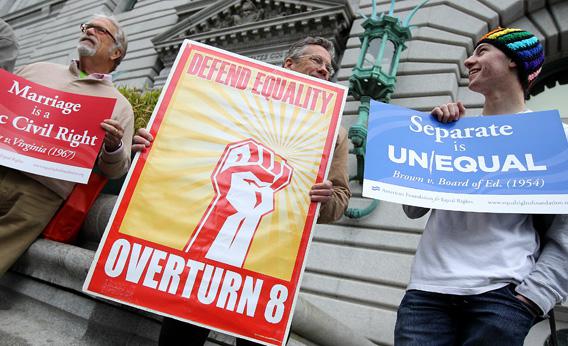It should come as no surprise to anyone that the (“liberal”) 9th Circuit Court of Appeals, led by the (“very liberal”) Stephen Reinhardt, struck down the state’s ban on gay marriage as unconstitutional. Prop 8, passed by referendum in November 2008, had already been thrashed to a pulp by a (“gay”) judge in August 2010, and when the federal appeals court heard the case in December 2010, it was manifestly clear that they were struggling to find some plausible rationale for a ban on gay marriage that made sense. And given that a lot of folks always thought the fix was in at the 9th Circuit, the real shocker today isn’t that a liberal panel delivered a liberal decision. Rather, what’s so surprising is that they delivered a far more moderate decision than anyone would have predicted.
Consider what a dismal job the proponents of Prop 8 did at trial in this case, proffering mediocre witnesses who proffered mediocre evidence that gay marriage would harm children and imperil heterosexual marriage. (Who can forget Prop 8’s star witness David Blankenhorn’s admission that he knew of no study that proved children reared by gay couples fared worse than those raised by heterosexual parents.) Then, recall the almost painfully meticulous findings of fact (80! 80 findings of fact!) produced by Judge Vaughn Walker to support his conclusion that Proposition 8 violated not just the constitutional promise of equal protection, but also a fundamental right to marry the partner of one’s choosing. Against this dramatic backdrop, today’s 2-1 decision is downright modest, corralling the ruling to apply only in California, and only because of the indignity of Prop 8, which “eliminated” a right that had already been granted same-sex couples. Confronted with massive constitutional questions, the majority wrote, “We need not and do not answer the broader question in this case, however, because California had already extended to committed same-sex couples both the incidents of marriage and the official designation of ‘marriage,’ and Proposition 8’s only effect was to take away that important and legally significant designation, while leaving in place all of its incidents.”
Today, the most liberal judges in the most liberal state on the most liberal appeals court had an opportunity to make history. Instead, they opted to do far less.
To be sure, there is an enormous amount of very powerful and stirring language in the majority opinion (almost 90 pages worth) about the singular meaning of the word marriage (including a strange visualization of prospective suitors proposing on a Jumbotron and citations to legal luminaries ranging from Marilyn Monroe to Groucho Marx). But in the end, Judge Reinhardt contented himself with the limited finding that since same-sex couples had all the same rights as heterosexual couples before Prop 8 was enacted, the only real effect of the ban was to strip from gay couples “the right to obtain and use the designation of ‘marriage’ to describe their relationships. Nothing more, nothing less.”
Don’t let all the shouting, protesting, and appealing fool you. Today’s decision could have been the vehicle to put the issue of whether there is a fundamental right to marry directly before the Supreme Court. But the panel explicitly stayed their decision so that nobody will marry in California tomorrow, and then declined to weigh in on the big constitutional question. Instead, they issued what can best be described as a Bush v. Gore type of ruling, good only in instances where states have granted gay couples the rights and privileges of marriage, thousands of citizens have availed themselves of that right, and a ballot initiative has then withdrawn that right. It doesn’t get much narrower than that.
The opinion is nothing less than a full-bore attempt to map the constitutional infirmities of Colorado’s Amendment 2—which stripped gay citizens of certain rights and was deemed unconstitutional—onto Prop 8. Since Justice Anthony Kennedy wrote that that 1996 decision in Romer v. Evans, and the other major gay-rights decision, Lawrence v. Texas, 7 years later, it makes perfect sense that Judge Reinhardt’s decision today would cite liberally from Kennedy’s language of personal dignity, a transparent attempt to appeal to the justice who will likely be the deciding vote in this or any other gay-rights case at the Supreme Court.* But given that there is at least some support for the argument that other gay-rights cases, specifically those challenging the Defense of Marriage Act, might be better vehicles for a major gay-rights decision at the high court, perhaps the fact that the 9th Circuit decision was a modest one is a net gain for supporters of gay marriage.
While virtually nothing can be said for certain—especially when several current justices are pushing 80—it’s a good bet that a blockbuster decision out of the 9th Circuit upholding a sweeping constitutional right to gay marriage might have been a tough one for Justice Kennedy to autograph. And if, in the end, his is the only autograph that truly matters, this narrow ruling may have been the wisest course.
It’s not yet clear whether the proponents of Prop 8 will appeal today’s decision to a larger panel of the 9th Circuit, or directly to the Supreme Court. In the meantime, supporters of gay marriage will certainly benefit from a few more years of shifting public opinion in favor of gay rights, and more states like Washington poised to legalize gay marriage. All in all, today’s ruling amounted to decidedly undramatic drama. It was about the furthest thing from a Hollywood ending ever to come out of California. But then again, it could be shrewdly setting the stage for an awesome sequel.
Correction, Feb. 7, 2012: This article originally stated that Lawrence v. Texas was decided 11 years after Romer v. Evans. (Return to corrected sentence.)
